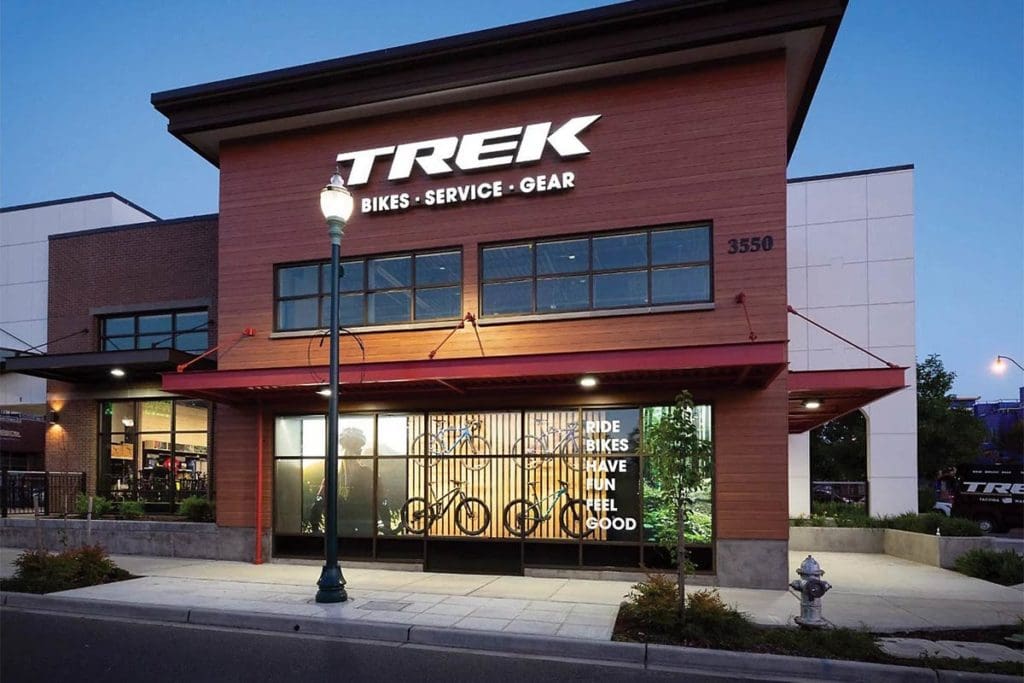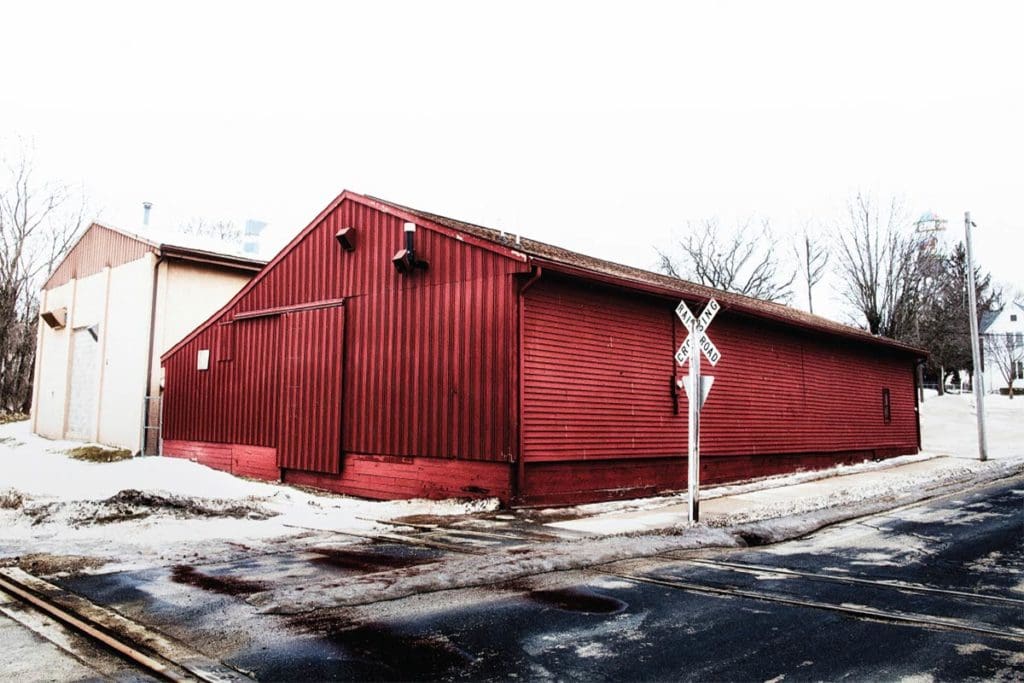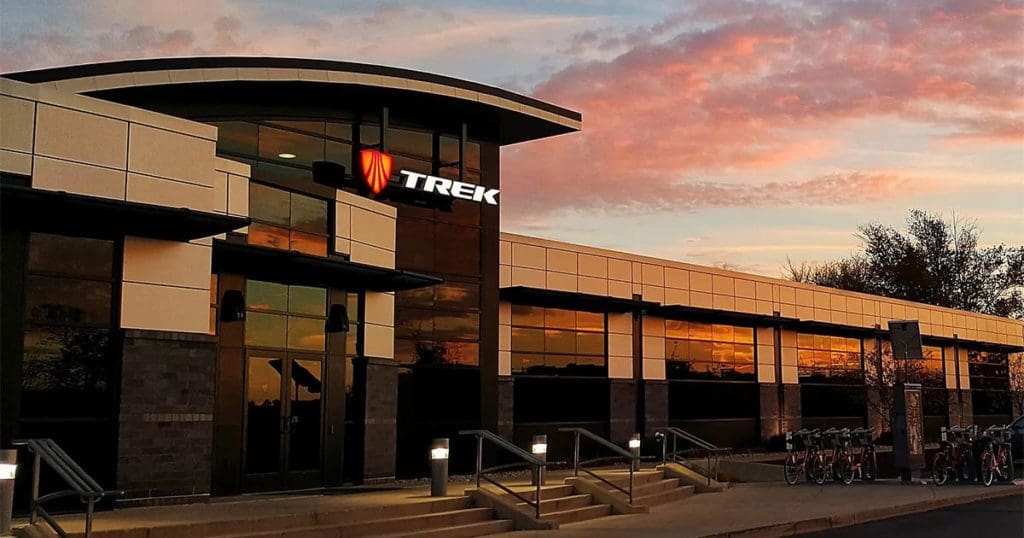Letter from America: The Major Players Are Getting Bigger – Fast!

By Marc Sani
The notion that perhaps too few high-value bicycle brands maintain too much clout among the globe’s major frame and component manufacturers seldom comes up in conversation. But unless you’re living in a cave, it takes no genius to note that the industry’s key manufacturers are tightly linked to Trek, Specialized, Giant and Dorel’s Cycling Sports Group.
And that raises several questions about consumer pricing, which seems relatively consistent across the flagship model lines owned by the Big Four—Trek, Specialized, Giant and Cannondale. All four consistently spec similar high-value components from the same companies and appear to operate more like a collegiate group rather than cut-throat competitors, for the hearts and minds of consumers.
But first a quick recap of the industry’s dominant players:
Shimano, which also owns Pearl Izumi, Lazer helmets and other brands is the number one component manufacturer but also a very significant supplier of cycling shoes.
SRAM is the number two component manufacturer but also owns RockShox, Avid, Truvativ, Zipp and Quarq.
Bosch E-Bike Systems probably leads the ebike drive systems race, for IBD level bikes.
Fox Factory Holding (which is completely separate from the Fox clothing company) rivals RockShox for suspension dominance. It bought RaceFace and Easton Cycling in 2014. It later picked up Marzocchi’s mountain bike assets in 2015.
SR Suntour, KMC chains and several tire brands like Kenda, Continental, Schwalbe, Maxxis and CST are all very strong in their respective markets.
Among other leaders I’d take note of is Tektro, which rumor has it could go public, Alex, a dominate OE (original equipment) rim supplier, Tien Hsien Industries, better known as FSA, saddle makers Velo, Cionlli and Selle.
Among dominant manufacturer/assemblers: Giant Manufacturing, Merida and Ideal, all publicly traded in Taiwan. Still, I hasten to note, there’s ample frame competition from Fairly, Kenstone, Asama, A-Pro and a raft of specialty builders.
A key link in this essentially consolidated segment of the high-value chain of bicycles sold mainly through IBDs is the growing sway of the Big Four market leaders. Of these, few would dispute the position of Trek, Giant and Spcialized, but some would question my inclusion of Dorel.
Dorel’s Cycling Sports Group is, in my opinion, a sleeper. In the U.S., besides Cannondale, it owns Pacific Cycle, a significant supplier to the mass market with core brands Schwinn, GT and Mongoose. It also owns Caloi, a Brazil-based manufacturer and the biggest bicycle brand in Latin America, with ample resources spread across Canada, Europe and Asia.
Symbiotic Relationships
It is the close relationship between top manufacturers and top bicycle brands that’s interesting to examine.
Let’s take Trek, for example. Although Trek makes some of its high-end bicycles at its USA headquarters, the majority of its bikes are made in Asia, which is also the case for most other global brands. Giant Manufacturing is Trek’s key supplier and has been for a number of years. The relationship is so tight that Giant, in its public filings, notes that if Trek were to move its business elsewhere, its corporate finances would take a serious hit.
And within the U.S. market it’s long been bandied about that Giant Manufacturing management keeps one eye on IBD unit sales and the other eye on Trek. No need to needlessly antagonize a vital customer. Giant has denied that rumor in the past.
Nonetheless, in my opinion, Trek is the most aggressive brand in the global marketplace, and especially in the U.S.

Trek is the only brand making a significant financial bet on developing an exclusive chain of U.S. retail outlets with back-end operations tightly consolidated and managed through its home base in Madison, Wisconsin.
It’s unclear how Trek finances them. Being a privately owned company, Trek is not obliged to release financial information. But their strategy has been to use cash to buy out retiring dealers in strong markets to maintain Trek’s dominance; a retail takeover of well-located but poorly managed stores in arrears on payments, or some combination thereof depending upon the location, sales and store management.
While hard numbers are tough to come by, various estimates are that Trek owns and operates some 200 retail stores in the U.S. and an unknown number in foreign locales. (Including just over 20 in Australia. Ed.) And let’s not underestimate its sway with some 1,700 American IBDs that stock Trek and its accessory brand, Bontrager, plus many more dealers around the globe.
But run through the specs on various models, particularly at the high end, and in the main, it’s primarily Shimano, Bosch, SRAM/RockShox, and Fox. Trek specs TransX droppers on some models and Formula pops up on others. But the majority of components like handlebars, saddles, grips, lights, etc. bear the Bontrager label. Attempting to track the sourcing for those bits and pieces would be a full-time job!
Trek is a global behemoth pushing US two billion dollars in annual sales (A$2.6 billion). John Burke, who took over the company upon the untimely death of his father, Dick, has assembled a first-class team of thinkers and doers. As a result Trek swings considerable weight with its suppliers on pricing and delivery. Trek always ranks high in component queues. And with volume, Trek, with its scale, wields a price cudgel that’s tough for smaller companies to beat.

Still, we tend to forget how Trek got where it is today. Over the years Trek has bought a number of companies. They include the Electra Bicycle Company, Klein Bicycles, which was later killed as a brand; Fisher Bicycles, which as a brand has disappeared although Gary Fisher remains a Trek spokesperson and industry personality.
Trek also owns Swiss brand Villiger and the German brand Diamant with a combined production facility in Hartmannsdorf, Germany.
Trek also bought Bontrager Cycles, a tiny company that once made small components and steel frames in Santa Cruz, California. Trek subsequently created a powerful and respected accessory brand under the Bontrager name. And, at one point, Trek had a licensing agreement with Greg LeMond, which ended in an acrimonious court dispute.
It’s seldom mentioned but Trek also owns BCycle, a bicycle sharing company. At last count it had 47 bike share systems operating in cities across the U.S. as well as under names other than BCycle. Its president is Bob Burns, Trek’s longtime attorney. It’s moving rapidly to introduce e-bikes into its BCycle operations.
Trek also has subsidiaries in Europe, Australia, Asia and South Africa as well as some 90 distributors worldwide. Its growing network of Trek-owned stores even includes China. In other words, Trek is a company with serious market clout and one to keep an eye on for more growth and new initiatives in the future.
Join the Conversation: What’s your opinion? Do you think the majors are becoming more dominant or less and do you think that’s a good or bad thing?

HamboCairns…great comment. So thanks…MicroShift could be a sleeper out there. Glad you mentioned them. Cheers, Marc
Polygon make a significant number of frames in Indonesia, and Microshift seem to be making some headway into OEM sales, appearing on Marin and Specialized (off the top of my head).